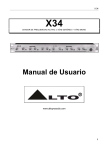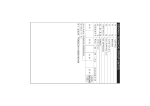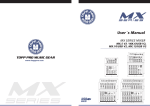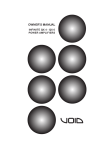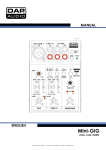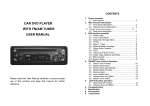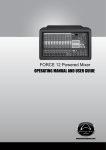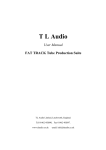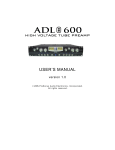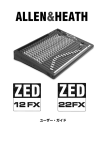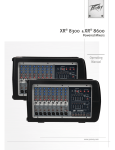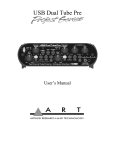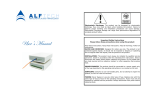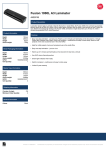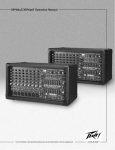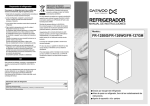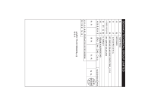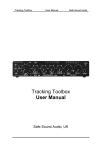Download MX .12FX - Topp Pro Professional Audio Gear
Transcript
MX.12FX 0.032KG NH00149 1:1 A3 A4 PHFAA102-20110300021 A5 MX.12FX TOPP PRO_V1.0 -RS- NF03555 TOPP PRO SEIKAKU TECHNICAL GROUP LIMITED 8 NPD-TO-201012003 4PCS MAR.15.2011 MX.12FX USER' S MANUAL MX.12FX 75Hz 75Hz 75Hz +4 10 75Hz DSP NF03555-1.0 15 15 15 15 15 15 15 15 15 15 15 15 +4 10 +4 10 +4 10 + +48V 88 10 PHANTOM 48V MX .12FX SAFETY RELATED SYMBOLS M X .12 F X GUARANTEE MX .12FX 9 M X .12 F X TABLE OF CONTENTS TECHNICAL SPECIFICATION Internal Digital Effect PEAK Indicator VU Meters Impedance Presets 100 1. INTRODUCTION...................................................................................1 Controls 100-Position PRESET Selector and Mute Switch 2. FEATURES...........................................................................................1 Display Two 7-egment display and Mute/Peak LED Indicator 3. USEFUL DATA.......................................................................................1 Type of effects VOCAL,SMALL ROOM,LARGE HALL,ECHO,ECHO+VERB, FLANGE+VERB,PLATE, CHORUS+GTR,ROTARY+GTR, TREMOLO+GTR Channel1-12 +17dBu Digital Effect(AUX send) +11dBu VU Meters +20dBu Main Left and Right (4-segment) Clip (+20), +6, 0, -20 (0 LED=0 dBu) Microphone Input 2.6k Ohms Line Input 10k Ohms CD/Tape Input 22k Ohms Main Outputs 120 Ohms Ctrl Room,Aux Sends 120 Ohms Tape Output 1K Ohms Phones Outputs 25 Ohms Phantom power Mic Pin2/Pin3 And Pin1(XLR-3-31 type balanced +48V 1=GND,2=HOT,3=COLD) Power supply Adaptor Power Consumption 18W Physical AC18V, 1000mA Dimension (L*W*H) 271*259*54.3mm Weightt Net:1.9kg 4. CONTROL ELEMENTS............................................................................3 5. INSTALLATION TIPS .............................................................................6 6. WIRE CONNECTIONS...... .....................................................................7 7. BLOCK DIAGRAM ................................................................................8 8. PRESET LIST........................................................................................9 9. TECHNICAL SPECIFICATION ...............................................................10 10. GUARANTEE ...................................................................................12 MX .12FX INTRODUCTION Thank you for purchasing the MX.12FX mixing console. There is 3-band EQ on mono channels. These M X .12 F X TECHNICAL SPECIFICATION Frequency Response Mic Input to any Output (Gain @ 0 dB, Rated output level) 20 Hz to 50 kHz(0, -1dB) 20 Hz to 130 kHz(0, -3dB) Please read this manual carefully so you can take advantages of all the features of the MX12FX. Distortion(THD&N) Mic Input to MAIN Output(Gain @ 0 dB, Rated output level @ 20 Hz-20 kHz bandwidth) 0.003%(A-weighted) Thank you again for making the right choice in purchasing the TOPP PRO MUSIC GEAR. MIC EIN (Equivalent Input Noise) Input: Channel INPUT MIC(Rs = 150 , Gain @ Max.,20 Hz-20 kHz bandwidth) CMRR(Common Mode Rejection Ratio) Mic in to Insert Send out (Gain @ Max.,@ 1 kHz) 60dB Input Gain Conrol Range (20 Hz-20 kHz bandwidth) Mono Channel Stereo Channel LINE:-8 to +6dB Attenuation (Crosstalk) (20 Hz-20 kHz bandwidth) Line in, 1/4" TRS Main Out,1 kHz relative to 0 dBu, 22 Hz 22 kHz Filter, Gain @ unity. Main Mix knob/fader @ -87dBu(A-weighted) mixers are really ideal for small club gigs. FEATURES 4 mono inputs with gold plated XLR and Balanced TRS jack 119dBu(A-weighted) MIC:0 to 48dB, LINE:-33 to +15dB Channel Level knob/fader @ - -85dBu(A-weighted) 4 stereo inputs with Balanced TRS jack Rated Output Level Main, Aux, Control Room output (all knob/fader @ 0 dBu,1 kHz) 0dBu GAIN control and +48V phantom power for mono inputs Maximum Output Level Main, Aux, Control Room output(all knob/fader @ 0 dBu,1 kHz, 22 Hz 22 kHz Filter,THD @ 1%) +20dBu 1 POST-fader AUX send for effect sends Mono Channel MIC INPUT MAIN OUT(1/4" TRS Unbalanced) 74dBu Peak LED in each channel Mono Channel MIC INPUT PHONES(1/4" TRS Stereo) 84dBu Mono Channel MIC INPUT AUX SEND(1/4" TRS Unbalanced) 79dBu Mono Channel MIC INPUT TAPE OUT(RCA) 74dBu Mono Channel LINE INPUT MAIN OUT(1/4" TRS Unbalanced) 59dBu Stereo Channel LINE INPUT MAIN OUT(1/4" TRS Unbalanced) 33dBu TAPE INPUT MAIN OUT(1/4" TRS Unbalanced) 10dBu 3-band EQ (plus 75Hz low cut filter) on all mono channels 2-Track IN/OUT with discrete switches for routing to Control Room and to Main Mix 24-bit internal DSP with 100 effects Maximum Voltage Gain (EQ and PAN/BAL knob @ 0 dB, Other all knob or fader @ max,DFX mute, 1 kHz, Rs=600 ) USEFUL DATA Please write your serial number here for future reference. MAIN OUT(all knob/fader @ 0 dBu, 22 Hz 22 kHz Filter,Gain @ unity) Serial Number: Data of Purchase: Main mix Noise (20 Hz-20 kHz bandwidth) Input HPF Equalization (Mono channels) Purchased at: 9 Main Mix knob/fader @ - , Channel Level knob/fader @ - -106dBu(A-weighted) Main Mix knob/fader @ 0dB, Channel Level knob/fader @ - -95dBu(A-weighted) Main Mix knob/fader @ 0dB, Channel Level knob/fader @ 0dB -93dBu(A-weighted) Channel1-4 75Hz, 18 dB/oct High 15 dB @12 kHz Mid 12 dB @2.5 kHz Low 15 dB @80 Hz M X .12FX 8 M X .12 F X PRESET LIST HOOKUP DIAGRAM No. Preset Description Parameter Small Club Gig Active Speakers Microphones 1 and 2 00~09 Vocal Simulate a small space with slight 10~19 Small Room Simulate a bright studio room Decay time: 0.7~2.1s Pre-delay: 20~45ms Rev.delay time: 0.8~0.9s Pre-delay: 10~45ms 20~29 Large Hall Simulate a large acoustic space Decay time: 3.6~5.4s Pre-delay: 23~55ms 30~39 Echo Echo/Delay effect Delay time: 145~205ms 40~49 Echo+Verb Echo & Reverb combination Delay time: 208~650ms Decay time: 1.7~2.7s 50~59 Flanger+Verb Flanger effect & Reverb combination Decay time: 1.5~2.9ms Rate: 0.8Hz~2.52Hz 60~69 Plate Simulate classic bright vocal plate Decay time: 0.9s~3.6s 70~79 Chorus+GTR Guitar Effect: Chorus Rate:0.92Hz~1.72Hz 80~89 Rotary+GTR Guitar Effect: Rotary Modulation depth: 20%~80% 90~99 Tremolo+GTR Guitar Effect: Tremolo Rate : 0.6Hz~5Hz Mono in/Stereo out Reverb MX.12FX Headphones 75Hz 75Hz 75Hz 75Hz +4 10 +4 10 +4 10 +4 10 PHANTOM 48V DAT Recorder +48V Keyboard Drum Machine DAT 10 CD Player Computer Set-up Active Studio Monitors Headphones Microphones 1 and 2 MX.12FX 75Hz 75Hz 75Hz 75Hz +4 10 Direct Box +4 10 +4 10 +4 10 Drum Machine Note: press the key TAPE TO CTRL RM/ PHONES to listen to sound card output in control room speakers & headphones. Disengage this button to listen to min mix. Do not engage button TAPE TO MIX to avoid feedback. Digital Audio Interface +48V Guitar PHANTOM 48V Digital Audio Workstation 10 M X .12FX M X .12 F X BLOCK DIAGRAM CONTROL ELEMENTS 1- Mono MIC Input The MX series is equipped with one or more low-noise microphone preamplifiers with optional phantom power providing up to 50dB of amplification. You can connect almostany type of microphone. Dynamic microphones do not need phantom power. Use phantom power only with condenser microphones but make sure that phantom power switch is disengaged before connecting the microphone. Phantom power will not damage your dynamic microphones but it may damage tube or ribbon microphones so make sure to read the microphone instructions manual before engaging phantom power switch. There are also equipped with 1/4" TRS balanced and TS unbalanced LINE IN plug, you can connect with line-level instruments, such as synthesizers, keyboards, drum machines or effect devices. NOTE: Never try to connect a line-level signal to the XLR MIC input when the phantom power is engaged, doing this you may seriously damage your equipment. 1 3 75Hz 4 2- LINE INPUTS They are organized in stereo pair and provided with 1/4" TRS sockets. It is used to connect the stereo device, plug both the left input and the right input. Using the left input if connect a mono input signal to the STEREO INPUT, the signal will appear on both sides. 2 3- GAIN CONTROL +4 10 This GAIN control is used to control the input sensitivity of the MIC and LINE inputs. The adjustable range goes from 0 dB to 50dB. 5 4- LOW CUT BUTTON By pressing this button, you will activate a 75Hz low frequency filter that cuts the bass frequency below 75Hz. You can use this facility to reduce the hum noise infected by the mains power supply or the stage rumble while using a microphone. 5- +4/-10 SWITCH +4/-10 switches are used to select the input sensitivity of the line inputs on the stereo channels. +4 dBu is suitable for professional audio devices and -10 dBv is suitable for general devices. If not sure to use which setting, try +4 dBu first, then change it to -10 dBv if the volume is too small to be satisfied. EQUALIZATION The MX.12FX has 3-band EQ on all mono channels . And all bands provide up to 15 dB boost or cut. 6- HIGH This is the treble control. You can use it to get rid of high frequency of human voice. The gain range goes from -15 dB to +15 dB with a centre frequency of 12 kHz. 6 15 7- MID This control provides 15 dB boost or cut at 2.5 kHz. It can affect most fundamental frequencies of all musical instruments and human voice. 7 15 8- LOW This is the bass control. It is used to boost male voice, kick-drum or bass guitar. Your system will sound much bigger than what it is. The gain range goes from -15 dB to +15 dB and the center frequency is 80 Hz. 8 15 9- AUX Send This control is used to feed the mono input of parallel effects devices or input of a stage monitor amplifier via the AUX SEND output jack. All the channel controls (except PAN or BAL) will affect the AUX signal. The signal is tapped off after the LEVEL control. The output from an external processor can come back via stereo channel and be added to the main mix. M X .12FX M X .12 F X WIRE CONNECTIONS CONTROL ELEMENTS Either the 1/4" TRS phone jack or XLR connector can be wired in balanced and unbalanced modes, 10- PAN/BAL which will be determined by the actual application status, please wire your system as the following Abbreviation of PANORAMA control for mono channels, for stereo channels, always says, BALANCE control. You can adjust the stereo image of the signal via this control. For mono MIC/LINE channels, keep PAN control in centre position and your signal will be positioned in the middle of stage that is to say the mono signal appears equally in both sides. Turn this control fully counterclockwise and the signal will be present only on the left speaker and vice-versa. For stereo channels, by rotating the BAL control, you can attenuate the signal of left or right. It means if turn the control to left, the right channel will be attenuated; if turned to right, the left channel will be attenuated. wiring examples: For 1/4" Phone jack + - + Tip + Tip Ring Ring Sleeve Sleeve Tip Sleeve 9 10 11 11- PEAK LED TRS Type Balanced TS Type Unbalanced TRS Type Unbalanced When this LED blinks, it warns you that you are reaching signal saturation and possible distortion. From this LED you can adjust the correct level, not too strong to cause distortion and not too weak to be lost in noise. For XLR Connector 12 12- LEVEL This control will adjust the overall level of this channel. If you set the LEVEL control in max, it's usually a sign that your GAIN is set too low. If set the LEVEL control in min, your GAIN may be too high. Pin2 (+) Pin2 (+) Pin3 (-) Pin3 (-) (Linked to Pin1 manually, 13- CD/TAPE INPUTS ) Pin1 ( ) Use the Tape Input if you wish to listen to your mixer from a Taper Recorder or DAT. When the TAPE TO MIX switch is pushed in, the signal coming from Taper Recorder will assign to main mix; when the CD/TAPE switch which on the front panel is engaged in the signal can also be assigned to the CONTROL ROOM/PHONES outputs. If you connect a mono device, you will need a "Y-splitter" RCA adapter. Pin1 ( ) XLR Type Unbalanced XLR Type Balanced In-line Connection 14- TAPE OUTPUTS For these applications the unit provides 1/4" TRS and XLR connectors to easily interface with most professional audio devices. Follow the configuration examples below for your particular connection. These RCA jacks will assign the main out signal to a tape recorder or DAT. The Balanced 3 3 2 2 SLEEVE RING TIP 1 3 2 TIP RING SLEEVE Tip Ring Sleeve Tip Ring Sleeve 1 2 1 2 3 3 Tip Ring 1 2 3 Sleeve Unbalanced 1 3 2 Tip Ring Sleeve TIP RING SLEEVE Tip 1 3 2 Sleeve 1 2 3 1 2 3 TIP SLEEVE 1 2 3 1 2 3 SLEEVE TIP Sleeve Tip Ring TIP RING SLEEVE SLEEVE RING TIP Cent r e Screen 1 1 TIP RING SLEEVE 3 3 15 16- TAPE TO CTRL RM/PHONES Switch 16 Switch is used to select the signal source for the CONTROL ROOM outputs, PHONES, and METERS. Release this switch, they all receive the main mix signal tapped after the MAIN MIX control. Engage this switch, they all receive the CD/TAPE Input signal. Turn down the CTRL ROOM/PHONES control before engaging. 17 18 Sleeve Tip Ring Sleeve Sleeve Tip Cent r e Sleeve Screen Tip Ring Centre Sleeve Screen 1 2 2 3 Engage this switch to monitor the aux send signal in the Control Room/ Phones outputs. Tip TIP SLEEVE 2 Connect a CD or Tape Deck to the CD/TAPE inputs, and push down this switch to add the CD/TAPE signal to the main mix. The volume level is controlled by MAIN MIX control. 17- FX TO CTRL ROOM Switch Tip TIP SLEEVE 14 15- TAPE TO MIX Switch 1 1 TIP RING SLEEVE TAPE OUT level is affected by MAIN MIX control. 13 1 2 3 19 18- CTRL ROOM/PHONES Control This control is used to adjust the signal level going to the CONTROL ROOM/ PHONES outputs. And it won't affect the Main Mix output. 19- MAIN MIX This control sets the level of main mix signals sent to the Main Outputs, Tape Outputs, CONTROL ROOM, PHONES, and LED Display. Note: When connecting a speaker to the speaker output jacks, please pay more attention to the level setting for avoiding damaging the speaker. Generally speaking, the faders will be positioned between 0 dB and the +5 dB. M X .12FX M X .12 F X CONTROL ELEMENTS CONTROL ELEMENTS 20- POWER LED 31- PEAK/MUTE LED This LED lights up when the power switch is turned on. +48V 21- PHANTOM 48V LED This LED will light up when the phantom power is switched on. NOTE: Turn down all output levels before operating this switch to avoid the possibility of "pop" in your speakers. Do not use phantom power with tube or ribbon microphones, as this may cause damage. This LED lights up when the input signal is too strong or in case of the digital effect module being muted. DSP 88 32- MUTE SWITCH 22- METERS This stereo LED meter will indicate the level of the overall output signal. 20 21 22 This switch is used to activate/deactivate the effect facility. 23 REAR PANEL 10 30 29 32 31 23- TO MAIN MIX CONTROL This control is used to adjust the volume of effect signal sent to MAIN MIX bus, which can be varied from - MX.12FX to +10 dB. POWER IN 18VAC 1000mA 24- MAIN OUT OFF ON 33 These 1/4" TRS jacks represent the end of the mixer chain, where your fully mixed stereo signal enters the real world. Connect these outputs to the inputs of your amplifiers, powered speakers, or serial effects processor (graphic equalizer, for example). 34 24 33- POWER IN 25- CTRL ROOM OUT These 1/4" TRS are used to assign the control room signal to the studio monitor speakers. They can also be used to provide another main mix output, or to monitor the CD/TAPE Inputs (when engage the TAPE TO CTRL RM/PHONES switch), or to monitor aux send signal (FX TO CTRL ROOM switch is engaged) 25 26- AUX SEND OUT 26 These 1/4" TRS are used to send out the signal from the AUX bus to external device such as effects equipment. Each channel has an AUX SEND control knob that adjusts how much of that channel's signal appear at each of the output. This output is affected by the channel LEVEL, but not MAIN MIX control. 27 This connection is where you connect the supplied external AC power supply to provide AC power to the mixer. Connect the external power supply to your mixer first, then plug the power supply into a suitable and properly rated AC outlet. NOTE: make sure you use the correct external power supply cable of providing 18V at milliamps. 34- POWER SWITCH Turn on & off the mixer. Turn on the mixer after all input have been connected and before you turn on the amplifier. Turn off the amplifier before you turn off the mixer. INSTALLATION TIPS PHANTOM 48V 28 27- PHONES OUTPUT This jack is used to send out the mix signal to a pair of headphones, and the signal is the same as the CTRL RM OUTS outputs. The level is controlled by the CTRL ROOM/PHONES knob. You can listen to the Main Mix, the CD/TAPE, or the AUX SEND depending upon the position of the TAPE TO CTRL RM/PHONES switch and FX TO CTRL ROOM switch. 28- +48V PHANTOM SWITCH This +48VDC phantom power switch only apply to the XLR microphone input. Never connect microphones when the phantom power is on already. 1- Speakers should be placed in a position that allows for unobstructe sound projection. In many instances is beneficial for speakers to be elevated on tripod stands to achieve maximum dispersion and reach. 2- Use professional advice or service when hanging and installing speakers. Please take precautions to secure them to prevent them from falling and hurting someone. Care should be taken as to not damage the cabinet or its components. Please comply with all pertinent Regulations. 3- Use quality cables. Using quality cables will ensure the best possible sound. DSP SECTION There is a powerful 24-bit/100 presets digital multi-effects built in your MX.12FX mixer, the effects include ECHO, FLANGER+VERB, PLATE and combinations of the above. 29- DISPLAY It displays the selected preset. 30- PRESET SELECTOR Adjust this knob to select the right effect you wish to perform. There are totally 100 options for you: ECHO, VOCAL, PLATE andversatile two-effect combination. When you are satisfied with the right preset, push this knob to store this preset you want. 4- For best results match the speakers to a good amplifier that matches the wattage and impedance of your speakers. Proper amplification power results in good quality audio and longer component life. Check out the power requirement for your cabinet. 5- Avoid pointing a microphone directly at an amplified speaker doing so, could cause feedback possibly damaging speaker components and your hearing. Enjoy the sound!









